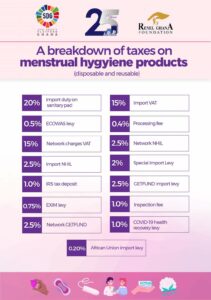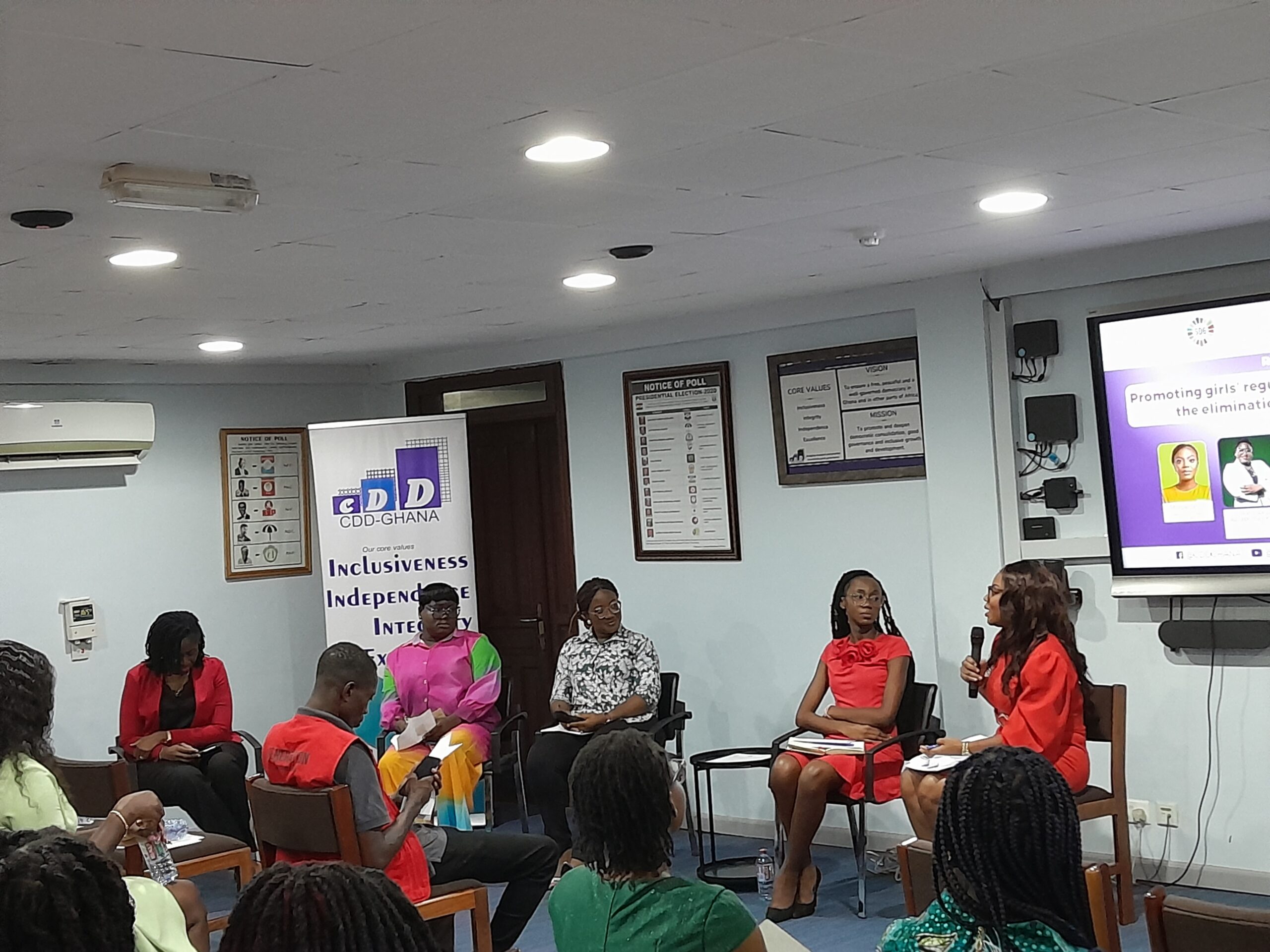
Accra, Ghana//-Campaigners at a roundtable discussion organised by Ghana Center for Democratic Development (CDD-Ghana) have called on the government to as a matter of urgency to remove the exorbitant import taxes imposed on sanitary products in the country.
According to them, the taxes which summed up to over 60% are making the prices of these sanitary pad products or menstrual hygiene products shoot up which majority of people such as young school girls, young women and women in the rural, peri-urban and the slum areas cannot afford.

The National Coordinator of Ghana Civil Society Organisations Platform on SDGs, Mrs Levlyn Asiedu lamented: “In most rural communities in Ghana, our young girls who are in menstrual ages are not able to afford the pads and use during their menstrual periods”.
She added that the hygiene products such as tampons, panty liners, menstrual cups, sanitary napkins, and other similar tangible personal property designed for feminine hygiene in connection with the human menstrual cycle, are also not accessible to school and rural girls.
So, the average young women in the West African country are going through a lot to get pads during their periods, Ms Lilipearl Baaba Otoo; Nana Akua Agyamponmaa Kyereh; Ms Francisca Sarpong Owusu; and Dr Priscilla Twumasi Baffour, said.
They added that some young girls and young women even go to the extent of engaging in sexual vices to get money for just pads for their use.
According to science, menstruation is the monthly shedding of the lining of the female uterus. It is also known by the terms menses, menstrual period, menstrual cycle or period. Menstruation is driven by hormones. Averagely, females start menstruating between the age of nine and age 55, and has a different cycle. However, the process is the same.
Contributing to the discussion, Founder and CEO of The Kyereh foundation, Nana Akua Agyapomaa Kyereh maintained that; “by eliminating taxes, we believe that period poverty will be reduced, and school attendance will increase.
A recent report by UNICEF revealed that, about 95% of girls in rural communities in Ghana miss around 20% of their school hours due to lack of access to sanitary pads.
While Ms Lilipearl Baaba Otoo, a business journalist at the B&FT newspaper noted that most young girls and adolescents who menstruate are forced to use inadequate materials to build makeshift products or use period products for a prolonged time which increase their chances of getting urinary tract infections among other diseases.
The Programe Coordinator of Renel Ghana Foundation, Stephen Amoah added that odours and leakages become a challenge for schoolgirls who menstruate without using pads.
These negative experiences of menstruating, according to him, could lead to low self-esteem, discomfort, distraction, absenteeism, and school dropouts, among others.
A Research Analyst at CDD-Ghana, Ms Francisca Sarpong Owusu added that addressing these issues and ensuring that menstrual hygiene products are considered essential could help improve the health and well-being of girls and women in the country.
She therefore called on her fellow campaigners, and other civil society actors to re-strategise their advocacy to enable them achieve results.
Senior Lecturer at the Department of Economics of the University of Ghana, Dr Priscilla Twumasi Baffuor admitted that although this is not the right time for removal of taxes conversation, the government could still do something about taxes on the pads.
Speaking in an interview after the event, the President for Ghana Chapter of Young African Women’s Congress Network, Ms Matilda Hammond said the government could consider subsidising the prices of the sanitary pads for the meantime while working to remove the taxes completely within some few years.
She explained that if subsidies are given, the prices of pads would go down that would make it affordable for schoolgirls.
Speaking at the roundtable discussion moderated by Ms Wendy Laryea, a broadcast journalist, the Head of Tax Policy Unit at the Ministry of Finance, Daniel Nuer stated the government is committed to ensuring that the issues of sanitary pads don’t affect young girls in schools.
He however could not assure the activists whether the taxes on the sanitary pads are going to be removed or not.
In his welcome address, the Director of Advocacy & Policy Engagement of CDD-Ghana, Dr Kojo Asante said as CDD-Ghana is celebrating its 25th anniversary, they are poised to deepen the linkages between good governance and improving health.
In Ghana, like many other countries in Africa, menstrual hygiene products attract a myriad of taxes due to their classification in the harmoniSed tax code.
The categorisation of menstrual hygiene products within the sales tax base in Ghana poses a significant barrier to menstrual health and hygiene as these taxes make them expensive and difficult to access, especially for girls and women in low-income households.


